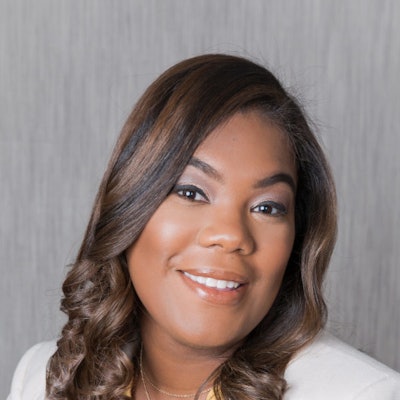Dr. De’Etra Jenra Young Title: Associate Dean for Academics and Land-Grant Programs and Associate Professor, Tennessee State University Education: B.S., Urban Forestry, Southern University and A&M College; M.S. and Ph.D., Forestry, Texas A&M University Age: 39 Mentors: Frances Williams, Tennessee State University; Chandra Reddy, Tennessee State University; Beattra S. Wilson, U.S. Forest Service Words of encouragement/wisdom: “Balance self and work by making self-care an absolute priority.” |
According to the National Science Foundation (NSF), geosciences have the lowest ethnic and racial diversity rates of any STEM discipline, but Dr. De’Etra Jenra Young is working to make sure it doesn’t stay that way.
Associate dean of academics and land-grant programs and associate professor in the College of Agriculture at Tennessee State University (TSU), Young knows just how powerful historically Black colleges and universities (HBCUs) are when it comes to retaining underrepresented students in the sciences. Not only does she teach at one, she’s a proud first-generation alumna of Louisiana’s Southern University and A&M College.
Yet Young also knows that — when it comes to earth sciences — HBCUs might not offer the extensive list of courses that can be necessary for employment or advanced degrees in geoscience, she says. So, Young took action. She partnered with Vanderbilt University, less than three miles down the road from TSU, to develop the Earth Horizons program. The NSF-funded program provides a variety of experiential and classroom experiences within the geosciences.
 Dr. De’Etra Jenra Young
Dr. De’Etra Jenra Young
For example, knowing that her students from urban areas may have little experience outdoors, she created a three-week field course to help students become more comfortable camping and working in the field.
But Earth Horizons is just one of the many ways Young is increasing access to the earth sciences. Among other initiatives, she also oversees the Dean’s Scholars Program, a mentoring and financial assistance program that provides paid research experiences for students in the College of Agriculture.
“We know that students are often working off campus to help with paying tuition or just to support their livelihood, so we created the Dean’s Scholars Program to provide an opportunity for our students to get paid [for] undergraduate research experience here on campus, so they don’t have to find off-campus jobs.”
Under Young’s guidance, all of the students within the program have been completing at least three internships and graduating within four years. Whether working with dean’s scholars or as project director for the 1890 Environmental Justice Academy — yet another program to broaden minority participation in the natural sciences — Young has established herself as a devoted mentor to students. In 2018, she was named the National Adviser of the Year by the national student organization Minorities in Agriculture, Natural Resources and Related Sciences.
“I spend a lot of time with students going through career goals, navigating issues, helping them find resources. We spend a lot of time working with students, just to make sure that once we recruit them and they come to school here, we retain them,” says Young, who calls mentoring “the exciting part” of her job.
“She is a natural teacher, a lifelong learner, and a solid and compassionate leader who inspires others to chase after their academic and professional dreams,” writes Dr. Chandra Reddy, dean and director of research at TSU, in his nomination letter. “Dr. Young is the go-to faculty member for students in the college and faculty colleagues admire her dedication and seek her guidance in mentoring students.”
On top of it all, Young has secured over $4 million in external grant funds as principal and co-principal investigator and is closely engaged with the community outside of TSU, too. She has served for the education committee of a local nonprofit, Urban Green Lab; she has developed a sustainability curriculum for K-12 students within Metro Nashville Public Schools; and she has been implementing urban greening programs within Nashville by planting trees in lower income neighborhoods — work that she calls “tree equity.”
“I’m looking at how we grow the number of trees that we need in our communities that may not have a tree canopy,” explains Young. “So when you think of the benefits of trees — fresh air, flood reduction, cooling neighborhoods and [alleviating] heat-related illnesses, even utility costs — we want that in all communities and not just certain communities.”
Her civic-minded efforts have earned her national recognition from the Sierra Club and Women’s Earth Alliance as well as The Nature Conservancy’s Climate Equity Innovation Lab for environmental leaders. She also earned Nashville’s Emerging Leader Award for education in 2018.
But, despite her many accolades, Young tends to spend more time talking about the generosity and help of her own mentors, sharing their names as though they were guideposts mapping out her educational journey.
“I’ve had some pretty incredible mentors,” she says. “They have been very instrumental to my success, and I would be remiss if I didn’t mention that.”
This article originally appeared in the January 20, 2022 edition of Diverse. Read it here.















